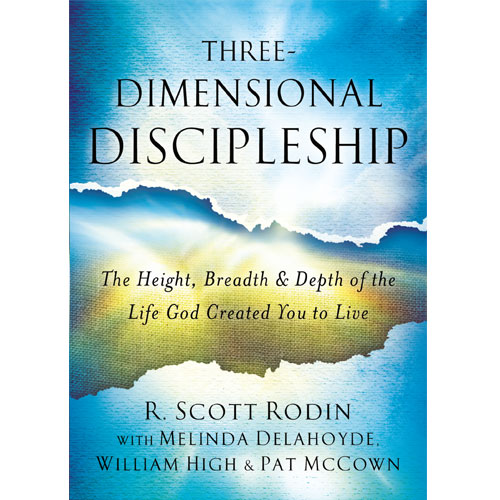The Journey to the Discipleship Zone

Some people call it being in “the flow,” “the groove,” or “the game.” The most common term for this phenomenon is being in “the zone.”
Theories and applications of being in the zone and its relationship with athletic competitive advantage are studied in the field of sport psychology. For athletes and performers this term defines a place where performance, and the pure joy derived from it, are unequaled. It is, as Daniel Goleman states in his book Emotional Intelligence: Why It Can Matter More Than IQ, “a single-minded immersion and represents perhaps the ultimate in harnessing the emotions in the service of performing and learning. In flow the emotions are not just contained and channeled, but positive, energized, and aligned with the task at hand.” (1)
Baseball players say the baseball looks like a cantaloupe when they are up to bat. They see the ball better and hitting becomes automatic, and pure joy. Golfers refer to it as being in “the slot,” every swing finding that perfect arc; hands and wrists and eyes all connecting in one effortless motion. Basketball players know they have made the shot before it leaves their hands. Tennis players have mentally returned a serve before their opponent has tossed the ball in the air. For other performers, the experience is the same. Pianists witness to an almost out of body experience as they watch their hands float across the keys in a semi-detached state of euphoria. Actors lose themselves in their character to such an extent that they momentarily forget who they are. Even writers can become so singularly focused on their work that they cannot type fast enough to capture their thoughts, and hours fly by like seconds. In every sport or artistic endeavor, there is a “sweet spot” that is coveted.
We know when we are in it, and we know when we are not. Getting in it requires focus and concentration combined with a willingness to let go of mechanics and techniques and allow natural abilities and pure energy to take over. Getting out of it usually involves distraction, loss of concentration, and the shifting of our focus from the natural to the mechanical.
Life outside the zone is hard. Baseballs look like golf balls, and golf balls look like marbles. Golf swings become stiff and mechanical as we focus on every small movement and try to correct every slight error. We become a bundle of nerves and seem constantly distracted by everything except that which we are trying to accomplish. The result is poor performance mixed with anxiety, stress, frustration, and despair. Ask a baseball player who is hitting below .200, a golfer with the shanks, or an author with writer’s block. It seems that from a physiological and psychological standpoint we were created to operate in the zone.
Defining The Zone In Discipleship Terms
If the ultimate human experience includes peak performance and deep joy, then we were meant to spend the majority of our lives in the zone. The same is true for our walk with Jesus Christ. There is a zone for Christians. It is a place where we live more fully for Jesus than anywhere else and experience the greatest joy as a result.
Most of the saints knew it. If you read the biographies and writings of the great sages of the Christian church, you’ll find in them a consistent testimony to their way of life that seemed to defy their own personal circumstances and the condition of the world around them. It was as if so many of the saints lived in a slightly altered state of reality that allowed them to exhibit Christ-like qualities in every situation in life.
Writing from the fifth century the monk Neilos of Sinai commented, “Detachment is the mark of a perfect soul, whereas it is characteristic of an imperfect soul to be worn down with anxiety about material things.” (2)
We see the same sense of alternative reality in the lives of so many of the biblical heroes and heroines. Alongside their deeply flawed character and sinful nature, we see their faith carry them into a state where nothing outside of them seemed to have any impact on their sense of purpose and inner peace. Daniel spent a peaceful night with ravenous lions. Paul sang praises to God from the depths of a dark prison on the night before he was to be executed. Shadrach, Meshach, and Abednego went willingly into the fiery furnace. Stephen looked to the heavens in rapture as stones were beating his body to death.
How do we understand such detached responses to such jarringly real experiences? From where does the strength and perspective come to walk through life in a state of peace and contentment amid a world of sharp, jagged edges and naked wires?
I believe the answer is found on the journey of the faithful steward. The markers on that journey are woven through scripture, bearing witness to the life Christ came to inaugurate for all of us as children of the triune God of grace.
It starts with the person of Jesus Christ. There is a mysterious nature to the life Christ lived. It is as if he were tuned into a different mental frequency than the people around him. He asked different questions, relied on a different source of strength and power, and moved in an alternate state of wellbeing and grace. He lived this way while being fully human. He was one of many itinerant rabbis of his day, just a Jewish boy with little training from a low-class family in a local town. But his presence drew people to him because he carried an aura about him that bore witness to a connection with God that no one else seemed to have—not the Pharisees, not the priests, not the Romans, nor the Sanhedrin. Jesus was a man who lived in a zone of power and grace. He could tap an unknown well of love and forgiveness that shocked and offended some and set many others free. And those near him sensed a power that, while almost always restrained, was somehow connected to the armies of heaven itself.
As followers of Christ, we are called to a life of participation in the perfect life that was lived already for us. We have the honor and the obligation to embrace this life as Christ did.
- We have been promised the mind of Christ (1 Corinthians 2:16).
- We are the body of Christ (1 Corinthians 12:27).
- It is Christ who lives in us (Romans 8:11),
- It is Christ who is making his appeal through us (2 Corinthians 5:20), and
- It is Christ who all others should see in us (John 17:20–26).
As disciples of Jesus Christ, we are to live as he lived, and that means being disciples who experience life on the journey, life in the zone. What Jesus promises to those of us who journey with him is an extraordinary, radically altered way of living. It includes peace, not as the world gives (John 14:27), abundant life that the thief cannot steal or destroy (John 10:10), life that is truly life (1 Timothy 6:19), peace that passes all understanding (Philippians 4:7), and truth that sets us free (John 8:32). This is the most uncommon life we can possibly imagine. It is a revolutionary departure from the ordinary, the routine, the mundane. It has a richness that few of us know but to whom each of us is called. It is life lived fully for him, life as we were created to live it, life in the zone.
There are three dimensions to this discipleship zone. Each of these has value on their own, yet when a person is able to yield to all three the combination provides a spiritual experience like no other. The zone is exactly where Christ wants us to be. It is the intersection of three dimensions of the Christian worldview that frees us, empowers us, and enables us to live for Christ like never before.
The Three Dimensions: Height, Breadth, and Depth
First, the discipleship zone has height. It is known by its ability to connect to the heavens through a humble and abiding relationship to God. We were created with a capacity for a deeper level of intimacy with God than we have ever experienced. It is there on the journey, waiting for us. We were created for this, and we are called and equipped to embrace it as our own. We discover this first dimension by abiding in Christ. This intimacy with God is the first step on the journey of the faithful steward, and is provides the height of the life of a disciple of Jesus Christ.
Second, the discipleship zone has breadth. It is wide and all encompassing in its understanding of God’s absolute ownership of everything. This simple truth has a rather staggering effect if we take it seriously. When we journey from being owners to stewards in every dimension of our life we experience the freedom of the faithful steward. This freedom is the breadth of the life of the disciple of Jesus Christ.
Third, the discipleship zone has depth. Following our newfound intimacy with God and our freedom as a steward of all of life, we can live with our neighbors as God intended and see them as we have never seen them before. Relationships provide the depth of our life’s journey if we will see our neighbors as ends and not merely as means. We were created to bear the image of a triune God—a God who is relationship in his very nature. This requires us to journey with our neighbor through this life. As we do we reflect that image in our relationships, and we add this third, essential component to the life of a disciple of Jesus Christ.
This is the three-dimensional structure of the life of a disciple who follows Jesus Christ. In this three-dimensional state we can experience the discipleship zone. It is a sacred place where heaven and earth almost touch. It is a transcendent place where God’s peace truly surpasses the situations we face on all sides. It is a solid place, a rock amid shifting sand, a sure foundation in a world of ever-crumbling moorings.
The steward’s journey is an invitation to live every moment of life in this zone. It is not meant for an occasional visit. It is not just the mountaintop euphoria or an escapist’s moment of fancy. It is the absolute reality of our very existence, the DNA of a child of God in Jesus Christ.
My prayer is that you will discover for yourself this very intimate, astonishing, and ever-present place where God and humanity dance to the sound of one heart and one spirit.
This is discipleship in three dimensions. If it beckons you, then welcome to the journey of discovery, the journey to the zone, the journey of the faithful steward!
This blog is adapted from Three Dimensional Discipleship (Scott Rodin, William High, Melinda Delahoyde & Pat McCown, Kingdom Life Publishing, 2009).
1 Goleman, Daniel. Emotional Intelligence: Why It Can Matter More Than IQ. Bantam Books, 1996, p. 91.
2 Neilos of Sinai (died c. 430) in The Philokalia: The Complete Text, compiled by St. Nikodimos of the Holy Mountain and St. Makarius of Corinth, Volume 1 (London: Faber & Faber, 1979) 244-245






